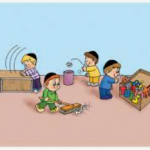Not everything that
counts can be counted, and not everything that can be counted counts.
Albert Einstein
When I read
this it made me STOP and think. How do we use data to inform our instruction
and impact our student’s lives? Is the data we spend so much of our time
collecting the right data? As you begin your school year, you will inevitably
have more data than you’ll know what to do with. At my school, we begin the
year reflecting on our data from the previous year. We ask questions like: What
worked? What didn’t work? What will we do differently? Humph. Are we spending
too much time focusing on student performance and not enough time focusing on individual
student learning?
I invite
you to examine the data for what it measures and take the time to know your
students and what their learning needs are. Who are they? Ask yourself: Who is Ariana?
Who is Kyle? Take the time to build relationships with your students so you
know WHAT needs to be counted to positively impact their lives.
Last week I
was pulling students who were absent during our school wide reading benchmark
assessment to test their reading fluency. While I was testing, classes would
walk by my room on their way to lunch or specials, waving and smiling, as they
passed by. I was almost finished when I stopped briefly. While I was feeling a
little guilty that I had not finished the stack, in walks a third grade student
who has been at our school for almost three years. He was on his way back to his
classroom from the nurse. He walked in my room and asked, “Mrs. Robinson, can I
have a hug?” I turned and gave him a hug. As he exited my room back to class, he
smiled and said, “Thanks.” I realized, had I not stopped, I would have missed
that moment. Before I went to pull the final few kids I stopped to reflect on
where this child has come over the past three years. The data, the numbers we
look at each year doesn’t tell his story.
I remember
the day he enrolled as a first grader at our school. He was wearing black
jeans, a white button down shirt and black cowboy boots. He was angry and
misunderstood. He didn’t have many friends. He was not successful as measured
by the test data. Over the past few years I have come to know him and have watched
him grow and find success. Today, he loves school and has many friends. But
unfortunately you would not know that from his test scores. You would have to
dig deeper and know him as a person, know his family, know how he learns. How
often do we let the test scores dictate how and what we teach? Does the data we
analyze really tell us what counts? What our students really needed?
So I ask
you again, “Are we spending too much time focusing on student performance and
not enough time focusing on individual student learning?”








